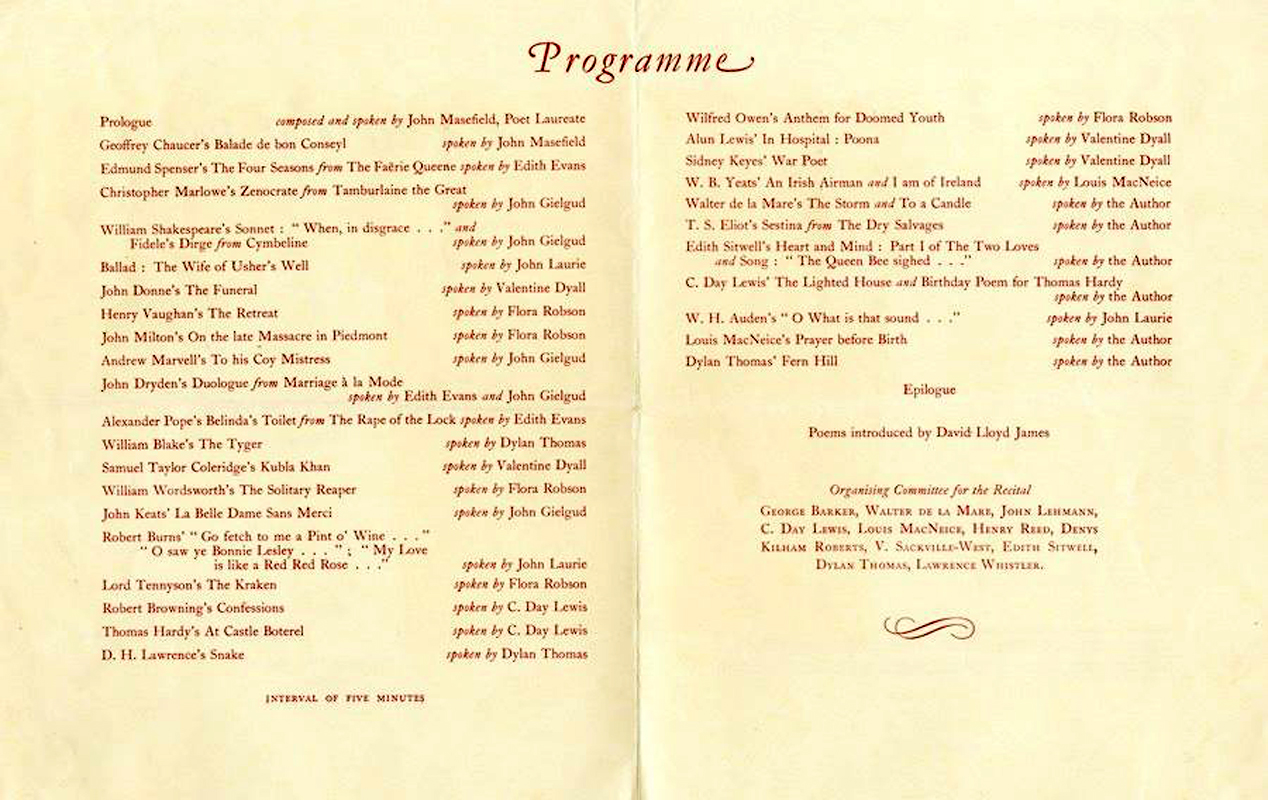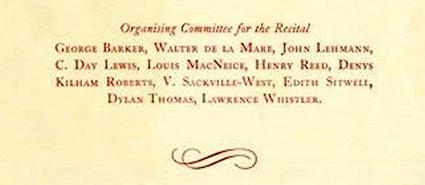|
|
Documenting the quest to track down everything written by
(and written about) the poet, translator, critic, and radio
dramatist, Henry Reed.
An obsessive, armchair attempt to assemble a comprehensive
bibliography, not just for the work of a poet, but for his
entire life.
Read " Naming of Parts."
|
Contact:
|
|
|
|
Reeding:
|
 |
I Capture the Castle: A girl and her family struggle to make ends meet in an old English castle.
|
 |
Dusty Answer: Young, privileged, earnest Judith falls in love with the family next door.
|
 |
The Heat of the Day: In wartime London, a woman finds herself caught between two men.
|
|
|
|
Elsewhere:
|
|
Posts from May 2015
|
|
|
27.4.2024
|
In the Spring, 1972 issue of the journal of the Society of Teachers of Speech and Drama there appears an argument for the release of recordings of Henry Reed's radio plays. Jane Gregg reviews two collections of Reed's plays produced for the BBC Third Programme, published in 1971 by BBC Publications: Hilda Tablet and Others: Four Pieces for Radio, and The Streets of Pompeii and Other Plays for Radio.
Gregg calls the Hilda Tablet plays "the funniest and most sustained piece of social comedy written for radio," and expresses concern over the ephemeral medium of "aural" art such as radio, arguing that Reed's plays should get the same treatment as Dylan Thomas' Under Milk Wood, and be released as recordings.

Hilda Tablet and Others — four pieces for radio
by HENRY REED. BBC: £2.10.
The Streets of Pompeii and other plays for Radio
by HENRY REED. BBC: £3.15.
All Third Programme listeners please note that the plays of Henry Reed you so enjoyed between 1949 and 1958 are now in print—a permanent memorial of the radio drama which otherwise has no permanent life.
As Reed says in a most interesting foreword to The Streets of Pompeii, 'They were not for the most part written with any idea that they might appear in print. When it was suggested that they should, I was naturally delighted: it seemed to imply that they had not entirely gone in one ear and out of the other'.
I have just taken up knitting and when reading the pattern I have tried to visualise the finished article. Possibly knit two together through back loops creates a picture for the experienced knitter but even so it remains for most of us simply a code. In the same way the printed word is a poor substitute for radio drama. 'Cross-fade rapidly' needs a great deal of aural imagination.
Hilda Tablet and Others consists of four pieces from what many regard as the funniest and most sustained piece of social comedy written for radio. They are A Very Great Man Indeed, The Private Life of Hilda Tablet, A Hedge, Backwards, and The Primal Scene, as it were. The productions were all by Douglas Cleverdon, with music by Donald Swann and the casts include most of the great BBC repertory names: Hugh Burden, Carleton Hobbs, Gwen Cherrell, Mary O'Farrell, Marjorie Westbury . . . (dear Marjorie Westbury as Steve in Paul Temple — there's nostalgia for you) . . . the list is endless and very well-loved. The plays arise out of the research by Reed's alter-ego Reeve into the life of Richard Shewin, novelist.
The Streets of Pompeii on the other hand contains those plays which have Italian themes and settings. They are Leopardi in two parts: The Unblest and The Monument; The Streets of Pompeii, Return to Naples, The Great Desire I Had, and Vincenzo. Again the productions were by Douglas Cleverdon with a cast which sounds like Who's Who in Radio.
The BBC are of course quite right and to be commended for publishing Henry Reed's radio plays but now, before they disappear aurally altogether, may we have them recorded? After listening to the record of Under Milk Wood recorded by Argo with the cooperation of the BBC, I am convinced that there is a market for radio plays on record.
JANE GREGG. I note with some dismay that a quick search of the British Library Sound & Moving Image Catalogue reveals no recordings of A By-Election in the 'Nineties (1951), The Great Desire I Had (1952), A Hedge, Backwards (1956), The Primal Scene, As It Were (1958), or Musique Discrète (1959). Perhaps, however, the current Save Our Sounds project might turn a few up.
|
1537. Radio Times, "Full Frontal Pioneer," Radio Times People, 20 April 1972, 5.
A brief article before a new production of Reed's translation of Montherlant, mentioning a possible second collection of poems.
|
On the inaugural International Dylan Thomas Day, Twitter turns up treasure! @DylanThomasNews posted a programme for a May 14, 1946 poetry recital performed for the Queen (and Princesses Elizabeth and Margaret) at Wigmore Hall, organized by the Society of Authors and featuring everyone who was anyone in mid-century poetry and theater:

Poems were introduced by David Lloyd James, with readings by John Masefield (Poet Laureate at the time), Edith Evans, John Gielgud, John Laurie, Flora Robson, Edith Evans, Dylan Thomas, Valentine Dyall, C. Day Lewis, Walter de la Mare, T.S. Eliot, Edith Sitwell, and Louis MacNeice.

The organizing committee consisted of George Barker, Walter de la Mare, John Lehmann, C. Day Lewis, Louis MacNeice, none other than Henry Reed, Denys Kilham Roberts (Chairman), Vita Sackville-West, Edith Sitwell, Dylan Thomas, and Lawrence Whistler.
Previously, we posted about how this particular poetry reading impacted the career of Vita Sackville-West.
|
1536. L.E. Sissman, "Late Empire." Halcyon 1, no. 2 (Spring 1948), 54.
Sissman reviews William Jay Smith, Karl Shapiro, Richard Eberhart, Thomas Merton, Henry Reed, and Stephen Spender.
|
Henry Reed was for many years a member of the Savile Club, Mayfair, London, where he spent much of his idle time drinking, playing bridge, drinking, and occasionally dining with friends (or the occasional boyfriend). Reed was probably introduced to the Savile by one of his more-established peers — Walter Allen or Louis MacNeice — but the attraction of the Savile surely resided in the fact that it had been the club of Reed's hero, Thomas Hardy.
A history of the club by Garrett Anderson, Hang Your Halo in the Hall: The Savile Club from 1868 (London: Savile Club, 1993), contains a section devoted to poets who were members of the club. Anderson relates a delightful anecdote concerning Reed having to appear in court to explain his inability to pay his council tax:
For his eightieth birthday in 1989 the Savile organized one of its more Lucullan Soirées to celebrate Sir Stephen's [Spender] years of membership and, as Patric Dickinson observed on the other occasion, nobody stopped talking for long. It is a pity that one of Spender's old friends, one of the more brilliant talkers in recent times, another Savile poet, Henry Reed, could not have been present.
Like several of his lyrical colleagues at the Savile, Henry brought translations of his classical predecessors as well as his own distinctive verse to a wider public through the medium of radio, and like Spender and Pudney he had been much influenced in his youth by Auden; like Pudney too he had served in Intelligence during the war and had produced one of the most famous poems in English to come out of it — "Naming of Parts". In 1946 his fellow Savilian Edward Sackville-West persuaded him to write a dramatization for radio of Moby Dick which was produced a year later featuring two other Savile members, Ralph Richardson and Bernard Miles. It won the Premio della Radio Italiana and established Henry with the critics as a radio dramatist with a rare poetic gift.
In 1970 a collection of his poems, The Lessons of War, was published to wide acclaim and in 1971 the texts of his poetic dramas for radio were published as The Streets of Pompeii. A Very Great Man and its sequels Hilda Tablet and Others also appeared, between them revealing much of the man himself, a master of comedy with a deeply sombre interior. In manner and appearance he resembled a classically educated Tony Hancock, presenting a lugubrious exterior from which emanated surprising flashes of wit. Many contemporary members will retain happy memories of evenings spent in his company. On one occasion when he was suffering one of his regular bouts of financial starvation he regaled the long table with an account of his appearance that morning before the magistrates to explain his inability to pay the rates: "And what, Mr Reed, is your profession?" asked the magistrate. Diffidently, Henry admitted that he was a poet. "Yes, yes," said the magistrate testily, "but what do you do for a living?" It should be pointed out that it was Reed's The Streets of Pompeii (1952) which won the Radio Italiana prize, for 1953.
|
1535. Reed, Henry. "Talks to India," Men and Books. Time & Tide 25, no. 3 (15 January 1944): 54-55.
Reed's review of Talking to India, edited by George Orwell (London: Allen & Unwin, 1943).
|
|
|
|
1st lesson:
Reed, Henry
(1914-1986). Born: Birmingham, England, 22 February 1914; died: London, 8
December 1986.
Education: MA, University of Birmingham, 1936. Served: RAOC, 1941-42; Foreign Office, Bletchley Park, 1942-1945.
Freelance writer: BBC Features Department, 1945-1980.
Author of:
A Map of Verona: Poems (1946)
The Novel Since 1939 (1946)
Moby Dick: A Play for Radio from Herman Melville's Novel (1947)
Lessons of the War (1970)
Hilda Tablet and Others: Four Pieces for Radio (1971)
The Streets of Pompeii and Other Plays for Radio (1971)
Collected Poems (1991, 2007)
The Auction Sale (2006)
|
Search:
|
|
|
Recent tags:
|
Posts of note:
|
Archives:
|
Marginalia:
|
|










